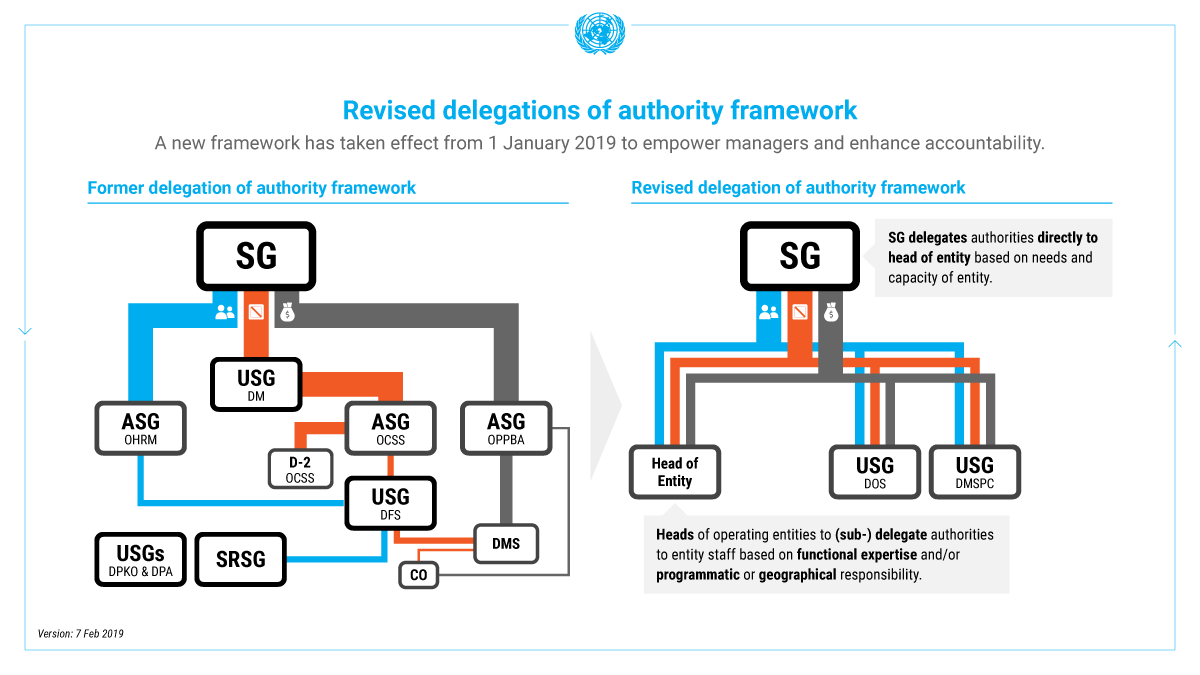Overview of Management Reform
Ensuring a better future for all
The new management paradigm was put forward to enable the Secretariat to more effectively and accountably deliver on its mandates, and therefore better positions the United Nations to confront global challenges.
Vision and Principles
Management reform is about improving the UN’s ability to deliver on its mandates. It seeks to improve its effectiveness, enabling it to act faster, more nimbly, with better information and be more accountable.
Management reform seeks to achieve the objective of enhanced effectiveness and accountability through three main shifts:
- Decentralization of decision-making authority: decisions should be taken at the point of delivery to ensure effective – and timely – response.
- Simplification of policies and procedures: policies and operational processes must be simplified and streamlined to ensure a nimbler, more efficient and effective mandate implementation globally.
- Empowerment of senior managers: responsibility for mandate implementation must be aligned with the authority to manage resources so that heads of entities are empowered to deliver on their mandates and can be held accountable for performance.
These efforts are being reinforced by a new annual approach to programme budgeting that is far more responsive to requirements and more clearly indicates how the work of each organizational unit is contributing to the achievement of the Sustainable Development Goals.
To facilitate these large changes, the Secretary-General also proposed a restructuring of the management architecture at Headquarters. The former Department of Management and Department of Field Support would be reorganized into two new departments: the Department of Management Strategy, Policy and Compliance (DMSPC) and the Department of Operational Support (DOS), each serving all of the Secretariat, including field missions, departments, offices, regional commissions, and tribunals. The two departments would have clear responsibilities: DMSPC focusing on management strategy, policy development, and monitoring compliance; DOS becoming the operational arm of the UN Secretariat, providing advice to empowered managers and global operational and transactional services.
Decentralization of decision-making authority
To bring decision-making closer to service delivery and empower managers, a comprehensive, new framework for delegation of authority (ST/SGB/2019/2) was designed and entered into effect on 1 January 2019 with the Secretary-General delegating authorities to heads of entity globally. The delegation of authority framework not only decentralized authority but also streamlined their delegation, highlighting clearly roles, responsibilities and accountability.
Revised delegations of authority framework. (Click to enlarge)
Simplification of policies and procedures
In 2017, the Secretary-General set out to comprehensively "review to remove unclear, obsolete and duplicate policies and create new, clear and simplified policies and administrative guidance." He also highlighted the need to streamline and simplify processes and procedures to enable managers to more nimbly and effectively deliver on their mandates.
Overall, the Secretary-General called for a fundamental shift in mindset. The biannual regular budget process was to be simplified and adjusted to an annual cycle to shorten budgeting timelines, enhance planning and increase responsiveness to emerging demands by Member States. In Human Resources Management, many policies and processes were to be reviewed as they were centralized, rigid and cumbersome, and often not adapted for effective use in the field. Procurement was marked by fragmentation, duplication, and onerous bureaucratic processes and controls and required realignment.
All reviewed policy and process guidance would flow into an easily searchable compendium, serving as the one source of truth for the UN Secretariat.
Strengthened accountability and transparency
The new framework for delegated authority set out to align resources with decision-making authority, which would enable the Secretariat to hold managers accountable. A new accountability framework was developed and introduced to monitor delegated authorities. Furthermore, the Secretary-General aimed to strengthen analytics, results-based management, compliance and evaluation capacities at Headquarters to ensure more transparency on operations, oversee accountability throughout the Secretariat and support Secretariat entities in ensuring better performance and accountability themselves.
Establishing new structures
A key first step in achieving management reform took place on 1 January 2019 with the launch of two new departments: the Department of Management Strategy, Policy and Compliance (DMSPC) and the Department of Operational Support (DOS). These cooperate closely to build a more responsive and field-oriented Secretariat. This includes co-chairing a Management Client Board to ensure systematic and integrated feedback between the new departments and their clients.
DMSPC provides strategic policy leadership in all areas of management. The department has key pillars in human resources management and financial management and stewardship. In addition, DMSPC has a dedicated capacity in business transformation and accountability. DMSPC offers project management capacity, and supports managers with results-based management, internal evaluation, enterprise risk management and other methodologies for innovation and organizational transformation.
DOS serves as the operational arm of the Secretariat. It provides advisory and other operational support services directly to clients and, where needed, exercise delegated authority on behalf of clients. The Department is organized to provide end-to-end service delivery and ensure integration of operational support for entities across the Secretariat in supply chain management, and other operational support functions such as human resources management, medical services and occupational safety and health. In addition, DOS provides administrative client and HQ campus support and provides more detailed planning and surge support in special situations.
The consolidated Office of Information and Communication Technology has a global mandate, overseeing all entities within the UN Secretariat, to avoid duplication of efforts and overcome fragmentation in ICT solutions. The Office is reporting to both, DMSPC and DOS on policy and operational matters respectively. Investments made in the area of information and communications technology have ensured business continuity in the face of the COVID-19 pandemic and unprecedented challenges.


